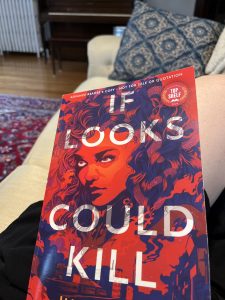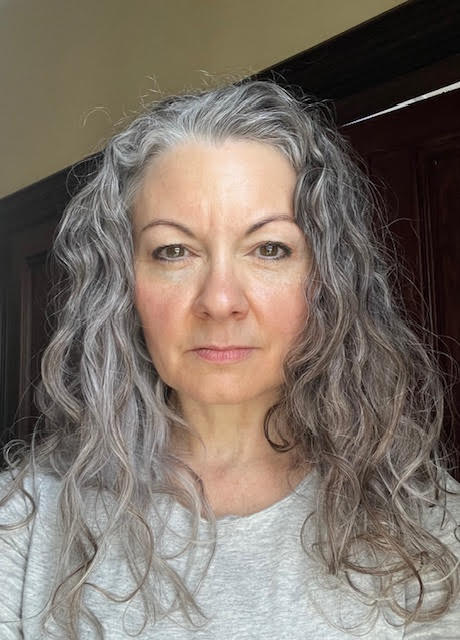Sometimes it takes our dearest friends to tell us who we really are, and what we’ve actually made. Author and artist Ginger Johnson (The Splintered Light, The Other Side of Luck) has been a “close bosom-friend” (Keats, “To Autumn”) for as long as I can remember. We met when I was 11, and her love for books, for life, and for me have have been among my guiding stars ever since.
As I look ahead to the publication of my new novel, If Looks Could Kill, I’ve wondered how best to write a blog post to tell the world what it is, and I realized I needed her help. So I asked her if she would write a review of my new novel, which I unapologetically share with you. Bias schmias. Sisterhood is an important theme in this story, and she is my sister in spirit, forever, amen.
Ginger Johnson’s Review of If Looks Could Kill
Since we have been lifelong friends, I’ve been in the unique and privileged position to see Julie’s work from the very beginning of her career. If Looks Could Kill is perhaps Julie Berry’s most challenging novel to date, and I daresay, her most important.
Julie has never shied away from addressing challenging subjects in her young adult novels. Nor does she now. This is a book of contrasts and juxtapositions, a book of questions with no simple answers, a book showing both false morality and true hypocrisy, as well as true morality and well, more hypocrisy. This is an exploration of real godliness and real charity, as well as the horrors humanity hands out to others. But If Looks Could Kill is also a dip into love and sacrifice and how we help those with whom we come into contact. If ever a historical novel can be timely, this is it.
 At its very essence, this novel pits Jack the Ripper, a character who is the embodiment of misogyny and violence toward women, against a Medusa sisterhood, the mythological representation of a “uniquely female form of power,” or an “irresistible dispenser of sudden death.” But this Medusa sisterhood has some limitations as it dispenses justice, leaving the reader uncertain of the outcome until nearly the end.
At its very essence, this novel pits Jack the Ripper, a character who is the embodiment of misogyny and violence toward women, against a Medusa sisterhood, the mythological representation of a “uniquely female form of power,” or an “irresistible dispenser of sudden death.” But this Medusa sisterhood has some limitations as it dispenses justice, leaving the reader uncertain of the outcome until nearly the end.
The novel begins with an epigraph of the definitions of the word petrify: “(1) to immobilize someone with fear; to terrify; and (2) To turn something or someone to stone.” With one fell swoop, Julie succinctly sets the stage for her characters. Who will be the terrified? Who will cause the terror? And will those roles ever reverse?
With this verbal suggestion, we are then introduced to the viewpoint of Jack the Ripper. It is not easy to give a platform to a perpetrator of such gruesome violence, but he is painted with the brush of ordinariness rather than the brush of sensationalism. He is not glamorized, but rather humanized. This serves to highlight the horror of his deeds. He becomes in some sense “Every Man Jack,” holding up a mirror to mankind when he offers this crumb of truth at the end of his prologue: “So write your screeds, you moralizers, but do not pretend you care for those women.”
We are then quickly introduced to Tabitha, who appears on the surface to be one of those moralizers, as she comes to us via the Salvation Army. But she is genuinely good, and she wants to do the right thing, even as she struggles with the knowing and the doing of the good—even as she struggles with the annoyance of her pious and perfect room-mate Pearl.
What commences is a gripping read of terror and transformation, taking these two young women into the depths of the Victorian-era Bowery on a rescue mission for a young woman who is coerced into working the sex trade. The story unspools at a fast pace, mostly from Tabitha’s point of view, but also from Jack’s and occasionally dipping into other perspectives, including Pearl’s.
Considering the thematic elements of the violence done to women’s bodies against their will, the most powerful part of this novel for me comes from a chapter written in Pearl’s point of view called “What We Owe a Body.” I won’t delve into what happens in that chapter, other than to say a question is put forth that is just as relevant today as it was for the women of Victorian London or the Bowery in New York:
“Who will plead for the worth of our bodies?”
As if from the dust, the voices of female victims of violence from time immemorial implore to be heard. Who indeed will understand the worth of our bodies? Who will engage with this dark history in a sensitive way—a way that withholds glory from the perpetrators, a way that challenges how “the male prerogative toward violence is privileged above the female right to exist” and brings female autonomy and life to the forefront?
I’m happy to say the answer to that is Julie Berry in her authorship of If Looks Could Kill. I highly recommend this book.
~~~
Ginger Johnson is the author of The Other Side of Luck and The Splintered Light and the founder of the genesis retreat, a writing and creativity retreat held annually in Oxford, England. Ginger holds a BA from Brigham Young University, an MA from Indiana University, and an MFA from Vermont College of Fine Arts. She can be found at www.gingerjohnsonbooks.com.
Instagram: @gingerjohnsonbooks, @gingerjohnsonart
Substack: @gingerjohnsonbooks
Bluesky: @gingerjohnson.bsky.social

